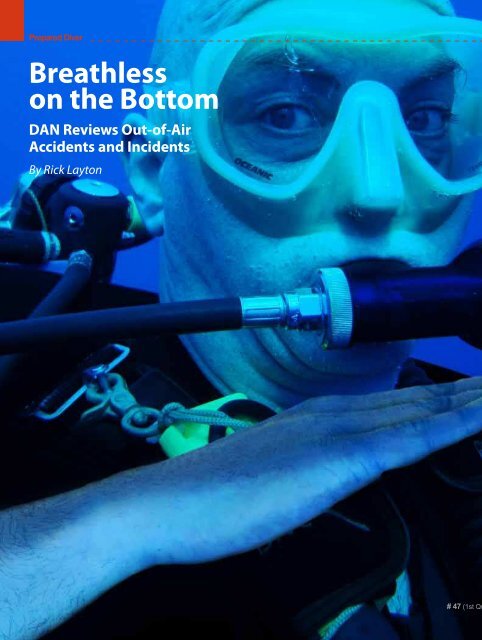notes - Aquaventure Scuba Diving Club
notes - Aquaventure Scuba Diving Club
notes - Aquaventure Scuba Diving Club
You also want an ePaper? Increase the reach of your titles
YUMPU automatically turns print PDFs into web optimized ePapers that Google loves.
Prepared Diver<br />
Breathless<br />
on the Bottom<br />
DaN reviews out-of-air<br />
accidents and Incidents<br />
By Rick Layton<br />
# 47 (1st Quarter 2012)<br />
Years ago a cave diver put something<br />
into perspective for me: You can go<br />
weeks without food, days without water,<br />
but only minutes without air.<br />
That pretty much sums up how critical<br />
it is for us to ensure we have an adequate<br />
air supply - and back-up breathing<br />
capability - before we drop into the<br />
depths.<br />
Whether we’re exploring the dark recesses<br />
of a cave system or roaming a<br />
sunny reef in 20 feet (6 meters) of crystal-clear<br />
water, suddenly running out<br />
of air presents a problem we must address<br />
right away. When divers are unable<br />
to deal successfully with such an<br />
event, the outcome can be fatal. In this<br />
issue, we take a look at some out-of-air<br />
emergencies.<br />
The nature of the problem<br />
The sea can be particularly unforgiving<br />
of divers’ mistakes: sometimes we<br />
don’t get second chances. The diving<br />
world reported 153 fatalities in 2003.<br />
According to the DAN Report on Decompression<br />
Illness, <strong>Diving</strong> Fatalities<br />
and Project Dive Exploration (the 2005<br />
edition, based on 2003 data), loss of<br />
breathing gas supply was a problem in<br />
at least 29 (nearly one-fifth) of those accidents<br />
for 2003.<br />
As the report states, “Among these<br />
were five solo divers who could not get<br />
help. In 15 cases, buddies separated<br />
intentionally or lost contact before running<br />
out of air. In two cases, divers did<br />
not check their gas supplies before<br />
their dives and started diving with nearly<br />
empty tanks.<br />
In one case, the diver used a rebreather<br />
that was so poorly maintained such that<br />
oxygen was not delivered due to a par-<br />
tial obstruction of the supply line. One<br />
diver consumed nearly all of his gas on<br />
the way into a cave.”<br />
This is indication that we can benefit by<br />
considering the prospects of out-of-air<br />
emergencies. Different errors and problems<br />
have left divers in the lurch when<br />
it comes to breathing gas.<br />
Consider the following “Top Ten Traps”<br />
that lead divers to an out-of-air scenario:<br />
1. Distraction; lacking situational (air<br />
supply) awareness<br />
2. Environmental considerations such<br />
as: exceeding planned depth, encountering<br />
currents, cold exposure,<br />
entanglements, and narcosis<br />
3. Regulator malfunction due to poor<br />
maintenance - or none<br />
4. Failures to O-ring, hose and diaphragm<br />
5. Free-flow due to sand, foreign particles<br />
or ice formation<br />
6. Erroneous (or lack of) pressure<br />
gauge readings and alarms<br />
7. Improper rigging of equipment<br />
8. Damage caused by impact, abrasion<br />
or sharp objects<br />
9. Failed mouthpieces<br />
10. Inadequate gas supply or an improper<br />
fill.<br />
A diver is lucky when he receives warning<br />
of an impending breathing gas<br />
problem. A free-flow, visible air leak or<br />
hard-to-breathe regulator may provide<br />
enough warning for a diver to make a<br />
normal ascent to the surface before he<br />
runs out of air completely. It’s quite a<br />
different situation when an attempt to<br />
take a breath is answered with a gulp<br />
of water or nothing at all. All too often,<br />
a diver in that situation makes a rapid<br />
ascent, and the outcome sometimes<br />
isn’t pretty.<br />
21


